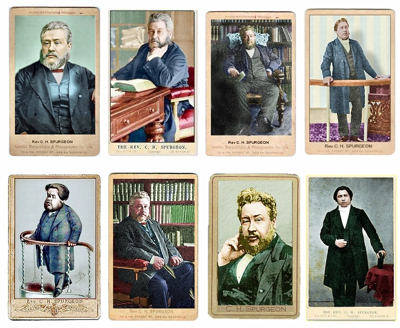Your weekly Dose of Spurgeon
The PyroManiacs devote some space each weekend to highlights from the lifetime of works from the Prince of Preachers, Charles Haddon Spurgeon. The following excerpt is from The Metropolitan Tabernacle Pulpit, volume 11, sermon number 651, "A sermon from a rush."

"If you do not mean your godliness, do not profess it."
The hypocrite will yield to good influences if he be in good society. “Oh yes, certainly, certainly, sing, pray, anything you like.” With equal readiness he will yield to evil influences if he happens to be in connection with them. “Oh, yes, sing a song, talk wantonness, run into gay society, attend the theatre, take a turn with the dice; certainly, if you wish it; ‘When we are at Rome we do as Rome does.’”
Anything to oblige anybody is his motto. He is an omnivorous feeder, and like the swine can eat the vegetable of propriety, or the flesh of iniquity. One form of doctrine is preached to him,—very well, he would not wish to contend against it for a moment; it is contradicted by the next preacher he hears,—and really there is a great deal to be said on the other side; so he holds with hare and hounds too.
He is all for heat when the weather is hot, and quite as much for cold when it is the season; he can freeze, and melt, and boil, all in an hour, just as he finds it pay best to be solid or liquid. If it be most
respectable to call a thing black, well, then, it is black; if it will pay better to call it white, well then it is not so very black, in fact it is rather white, or white altogether if you like to call it so.
The gross example of the Vicar of Bray comes at once to one’s mind, who had been a papist under Henry VIII., then a protestant under a Protestant reign, then a papist under Mary, then again a Protestant under Elizabeth; and he declared he had always been consistent with his principle, for his principle was to continue the Vicar of Bray.
Some there are, who are evidently consistent in this particular, and in the idea that they will make things as easy for themselves as they can, and will get as much profit as they can, either by truth or error. Do you not know some such? They have not an atom of that stern stuff of which martyrs are made in the whole of their composition.
They love that modern goddess, charity. When Diana went down Charity went up; and she is as detestable a goddess as ever Diana was. Give me a man who will be all things to all men to win souls, if it be not a matter of principle; but give me the man who, when it comes to be a matter of right and wrong, will rather die than deny his faith; who could burn, but could not for a moment conceal his sentiments, much less lay them aside until a more convenient season.
True godliness, such as will save the soul, must not be the mere bark, but the heart, the sap, the essence of a man’s being—it must run right through and through, so that he cannot live without it. That religion is not worth picking up from a dunghill which you do not carry every day about with you, and which is not the dearest object for which you live. Beloved, we must be ready to die for Christ, or we shall have no joy in the fact that Christ died for us.


 n 1942, Englishman C.S. Lewis published a book entitled The Screwtape Letters.
n 1942, Englishman C.S. Lewis published a book entitled The Screwtape Letters.  In it, a senior devil named Screwtape details to his nephew and underling Wormwood methods for waylaying and ultimately damning his intended victim. The book is a clever and revealing look at how the actual devil, Satan, goes about perpetrating his odious work in the world. One overarching theme behind Screwtape's instruction to Wormwood is how the subtle provocation away from truth is usually more helpful in bringing souls to hell than blatant exposures to deplorable sins. Writes Screwtape to his young apprentice, "Indeed the safest road to Hell is the gradual one—the gentle slope, soft underfoot, without sudden turnings, without milestones, without signposts . . . ."
In it, a senior devil named Screwtape details to his nephew and underling Wormwood methods for waylaying and ultimately damning his intended victim. The book is a clever and revealing look at how the actual devil, Satan, goes about perpetrating his odious work in the world. One overarching theme behind Screwtape's instruction to Wormwood is how the subtle provocation away from truth is usually more helpful in bringing souls to hell than blatant exposures to deplorable sins. Writes Screwtape to his young apprentice, "Indeed the safest road to Hell is the gradual one—the gentle slope, soft underfoot, without sudden turnings, without milestones, without signposts . . . ."
 This is, of course, baldly refuted throughout Scripture. You know, dear Wormwood, that the prayers and other acts of service done by those who have not yet been redeemed by our Enemy through repentance and faith are an abomination to Him (Prov. 15:8; 28:9; Isa. 64:6). In fact, this is nothing other than legalism, that old tried and true tactic perfected by the Pharisees, yet still a compelling vice all these years later. This falsehood remains enticing because sinners warm to the idea that they might offer works to be approved by our Enemy, and recoil at being told they can do nothing to merit His acceptance. The endurance and flourishing of legalism explains how much of the professing Church today is bursting with spiritual activity and service rendered to our Enemy with absolutely no clue how to be truly reconciled to Him (2 Cor. 5:18-21).
This is, of course, baldly refuted throughout Scripture. You know, dear Wormwood, that the prayers and other acts of service done by those who have not yet been redeemed by our Enemy through repentance and faith are an abomination to Him (Prov. 15:8; 28:9; Isa. 64:6). In fact, this is nothing other than legalism, that old tried and true tactic perfected by the Pharisees, yet still a compelling vice all these years later. This falsehood remains enticing because sinners warm to the idea that they might offer works to be approved by our Enemy, and recoil at being told they can do nothing to merit His acceptance. The endurance and flourishing of legalism explains how much of the professing Church today is bursting with spiritual activity and service rendered to our Enemy with absolutely no clue how to be truly reconciled to Him (2 Cor. 5:18-21).
 Dr. Eakin is a sports medicine orthopædic surgeon in the Bay Area and part time teacher at Grace Bible Fellowship Church's Stanford campus ministry. He is the author of
Dr. Eakin is a sports medicine orthopædic surgeon in the Bay Area and part time teacher at Grace Bible Fellowship Church's Stanford campus ministry. He is the author of 
 t. Augustine desired to be always found aut precantem, aut predicantem; that is, either praying or preaching; either speaking to God for men in prayer, or speaking for God to men in his ministry. Ministers of Christ especially should give themselves, not to the serving of tables, but to the ministry of the word and to prayer. For us to give ourselves to getting up entertainments, to become competitors with theatres and music-halls, is a great degradation of our holy office. If I heard of a minister becoming a chimney-sweep to earn his living, I would honour him in both his callings; but for God's watchmen to become the world's showmen is a miserable business. God keep all of us who are ministers of Christ from entangling ourselves with the things of this life! The proverb says, "Stick to your last, cobbler"; and I would say—Stick to your pulpit, minister! Keep to your one work, and you will find quite enough for all the strength you have, and even more.
t. Augustine desired to be always found aut precantem, aut predicantem; that is, either praying or preaching; either speaking to God for men in prayer, or speaking for God to men in his ministry. Ministers of Christ especially should give themselves, not to the serving of tables, but to the ministry of the word and to prayer. For us to give ourselves to getting up entertainments, to become competitors with theatres and music-halls, is a great degradation of our holy office. If I heard of a minister becoming a chimney-sweep to earn his living, I would honour him in both his callings; but for God's watchmen to become the world's showmen is a miserable business. God keep all of us who are ministers of Christ from entangling ourselves with the things of this life! The proverb says, "Stick to your last, cobbler"; and I would say—Stick to your pulpit, minister! Keep to your one work, and you will find quite enough for all the strength you have, and even more.










